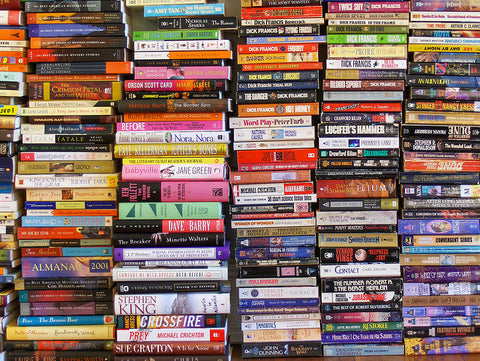If you’re an author, you probably have an unhealthy obsession with Amazon rankings. If you find yourself refreshing the Amazon page of your book every few hours know that you are not alone. Yet for all the attention paid to Amazon rankings, little is truly known about how the rankings system actually works.
THE IMPORTANCE OF AMAZON RANKINGS
Why the obsession? Compared to waiting months for a royalty statement outlining a book’s sales up to that point, a title’s Amazon ranking is one of the best indicators of how a book is doing in relation to other books. And fortunately (or unfortunately, depending on the level of your obsession), these rankings are updated on an hourly basis. The system is still flawed, as you’ll see below.

(photo: Joe Shlabotnik)
A higher Amazon ranking can also feed upon itself since being in the top 100 means your book is more likely to appear alongside other similar books which then leads to more sales which leads to a higher Amazon ranking. “If you crack the top 50, even if it’s only for an hour, you’re significantly higher in all categories,” says Harry Kirchner of Ingram Publisher Services in a New York Times article.
HOW THE RANKINGS SYSTEM WORKS
Rankings can often be quite volatile since selling just one book can propel a title with a ranking of six digits or higher several hundred thousand spots. Rankings for books are updated every hour and are relative to other books sold within that same hour. If you sold several books yesterday before but haven’t sold any today, you will likely see your ranking drop into the hundreds of thousands after having a ranking below 10,000 only the day before.
Lifetime sales are also figured in to the rankings, however, but take a backseat to hourly sales figures. An Amazon spokeswoman confirmed this in an article on MSNBC.com, “We base rankings on all-time sales, as well as recent sales that are weighted more heavily than older sales, so that our lists are timely and aren’t always dominated by all-time best-sellers like Harry Potter.”
Given how much authors, publishers and anyone with an investment in a particular book obsesses over Amazon rankings, they really are not that accurate. For one, a large part of the algorithm is based on projections. As Brent Sampson explains in an article for Web Pro News:
“[In addition to sales comparisons against other books] a trending calculation is applied to arrive at a computerized sales trajectory. So, hypothetically, a book that held a ranking of 2,000 at 2pm and 3,000 at 3pm, might hold a 4,000 ranking at 4pm, even if it actually sold MORE books between 3-4 than it did between 2-3.”
For an extremely detailed analysis of how Amazon rankings work, you can read the work of Patricia Walsh at http://patriciawalsh.com/AmazonSalesRank.htm
If you want a nice breakdown of what each range equals as far as book sales (example: ranking of 1,000-10,000 equals between roughly 10 – 100 copies being sold per week) check out this informative post on Web Pro News.
What about you? If you’re an author do you find yourself obsessing over your Amazon rankings? If you’re a reader, does a book’s Amazon ranking have an effect on your interest in the book?





Leave a comment